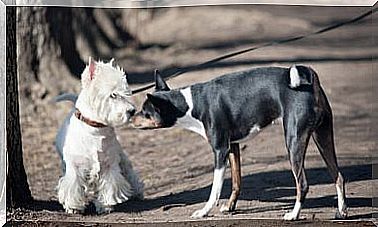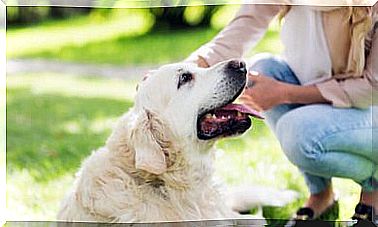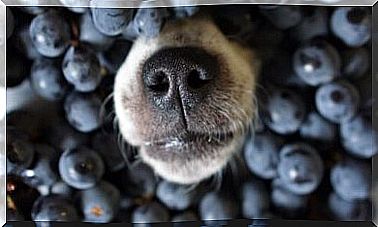Vitamin K For Dogs: Benefits And Side Effects

To understand the need for vitamin K for dogs, we must understand that it is a nutrient they need to stay healthy. Its main actions include modulating the processes of blood clotting and bone health. In this article we will learn about these and other effects of vitamin K.
Types of natural vitamin K
There are two forms of vitamin K: the first, made by plants, is K1 or phytonadione. Green leafy vegetables, such as broccoli and Brussels sprouts, are rich in vitamin K, in its K1 form.
On the other hand, vitamin K2 or menaquinone is made by bacteria that reside in the intestine of mammals. Thus, this vitamin is produced during the digestion of food.
Types of synthetic K vitamins
The chemical industry ventured into the production of synthetic forms of vitamin K. Thus, on the market there are vitamins K3 (menadione), K4 and K5.
Vitamin K3 was found to be toxic by interfering with glutathione function: it causes liver toxicity and damage to cell membranes. For this reason, its use was prohibited since 1963 to treat vitamin K deficiency in humans.
Although their use is discouraged, the three synthetic forms of vitamin K are used in many areas. These include the pet food industry (vitamin K3) and in order to inhibit the growth of fungi in processed foods (vitamin K5).
Vitamin K3 can be easily identified on pet food labels. Vitamin K3 is indicated by the names menadione sodium bisulfate, menadione sodium bisulfite, or menadione dimethylpyrimidinol bisulfite.
Functions of this vitamin in dogs
Vitamins K1 and K2 are fat soluble compounds. The K1 form is absorbed from the proximal small intestine and requires bile for absorption. The K2 form is absorbed from the ileum and colon.
After intestinal uptake, vitamin K undergoes recycling in the liver. It is in this organ where vitamin K acts as a cofactor for the modification of a group of proteins.
This group of proteins includes the factors of the coagulation cascade. Osteocalcin is also a growth factor and a relevant protein for bone and dentin metabolism.
The dependent modification of this vitamin is a requirement so that these proteins can interact with calcium and become operative in the coagulation process.
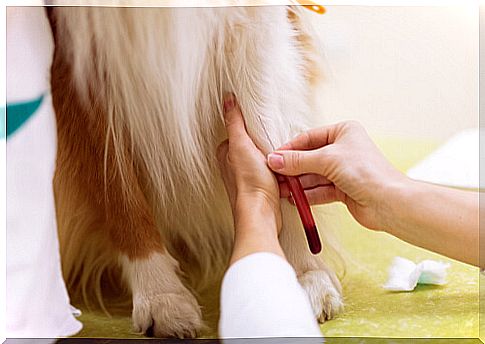
What clinical use is the administration of vitamin K for dogs?
Vitamin K for dogs is administered in several specific cases. For example, in poisoning by rodenticides, such as warfarin, which act by effectively blocking the liver recycling of vitamin K.
These poisons induce the inability to produce essential coagulation factors, mainly coagulation factors II and VII.
Thus, vitamin K treatment for rodenticide-poisoned dogs has been used successfully as an antidote. In these cases, the antidote works in both pets and humans exposed accidentally – or intentionally – to blood-thinning poisons.
On the other hand, vitamin K for dogs is administered in cases where there is a condition that prevents its normal absorption. This happens in cases of liver disease, in addition to prevention and treatment of weak bones or osteoporosis.
Hemophilia is a disease characterized by an inherited defect that prevents normal blood clotting. In this case, treatment with this vitamin seeks to counteract the risk of significant bleeding.
If your dog has undergone a prolonged course of antibiotics, which has altered the intestinal microbiota, he may need a vitamin K supplement . It will be necessary to supplement his diet until his intestinal bacterial ecosystem is restored to normal.
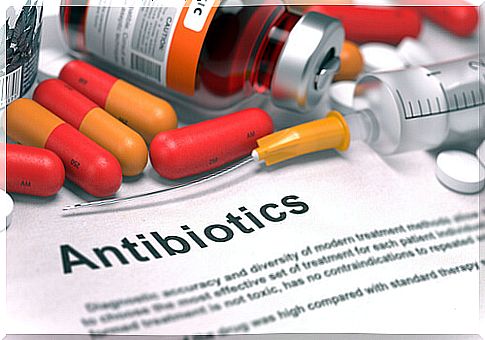
Side effects of treatment with this vitamin
Treatment with high doses of this vitamin in dogs should be administered with caution. This is so because it has been reported that vitamin K3 (menadione) can induce hemolytic anemia in dogs, when 4 mg / kg is administered for 5 days.
It should be noted that vitamin K takes a day to work when administered by any route. Remember that the new proteins must be synthesized, since the already circulating clotting factors will not be modified by the treatment.
Therefore, in life-threatening situations such as severe bleeding, vitamin K should not be relied upon to provide immediate hemostasis. Instead, you should include a source of active clotting factors, such as a transfusion.
Finally, it is necessary to mention that dogs must obtain most of the essential nutrients from their diet. The diet should contain vitamins, minerals, dietary fibers and other substances beneficial to health.
Only in some cases, the dog should consume fortified foods and dietary supplements to provide nutrients that, otherwise, would not be consumed in the minimum recommended amounts.
